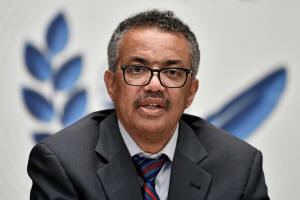Vaccine nationalism puts world on brink of 'catastrophic moral failure':
WHO chief
 Send a link to a friend
Send a link to a friend
 [January 18, 2021]
By Emma Farge [January 18, 2021]
By Emma Farge
GENEVA (Reuters) - The world is on the
brink of "catastrophic moral failure" in sharing COVID-19 vaccines, the
head of the World Health Organization said on Monday, urging countries
and manufacturers to spread doses more fairly around the world.
WHO Director-General Tedros Adhanom Ghebreyesus said the prospects for
equitable distribution were at "serious risk" just as its COVAX
vaccine-sharing scheme aimed to start distributing inoculations next
month.
He noted 44 bilateral deals were signed last year and at least 12 have
already been signed this year.
"This could delay COVAX deliveries and create exactly the scenario COVAX
was designed to avoid, with hoarding, a chaotic market, an uncoordinated
response and continued social and economic disruption," he said.

Such a "me-first approach" left the world's poorest and most vulnerable
at risk, he said at the opening of the body's annual Executive Board
meeting in virtual format.
"Ultimately these actions will only prolong the pandemic," he added,
urging countries to avoid making the same mistakes made during the H1N1
and HIV pandemics.
The global scramble for shots has intensified as more infectious virus
variants circulate.
Tedros said more than 39 million vaccine doses had been administered in
49 higher-income countries whereas just 25 doses had been given in one
poor country.
[to top of second column]
|

World Health Organization (WHO) Director-General Tedros Adhanom
Ghebreyesus in Geneva Switzerland July 3, 2020. Fabrice Coffrini/Pool
via REUTERS

A delegate from Burkina Faso, on behalf of the African group,
expressed concern at the meeting that a few countries had "hoovered
up" most of the supplies.
Observers say this board meeting, which last until next Tuesday, is
one of the most important in the U.N. health agency's more than
70-year history and could shape its role in global health long after
the pandemic ends.
On the agenda is reform of the body as well as its financing system,
which was revealed as inadequate after its largest donor, the United
States, announced its withdrawal last year.
"WHO has to remain relevant and ... has to come out of this crisis
with more strength than before," said WHO Executive Board Vice-Chair
Bjoern Kuemmel of Germany in comments last week.
But he expected resistance from some countries to pressure to boost
financial contributions.
(Reporting by Emma Farge; Editing by Michael Shields and Nick
Macfie)
[© 2021 Thomson Reuters. All rights
reserved.] Copyright 2021 Reuters. All rights reserved. This material may not be published,
broadcast, rewritten or redistributed.
Thompson Reuters is solely responsible for this content.
 |